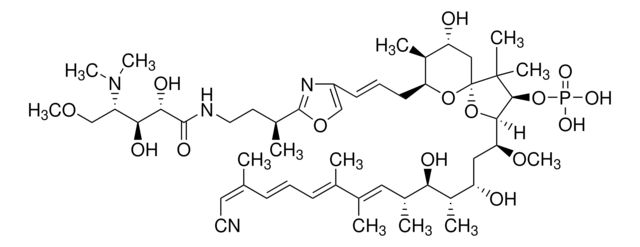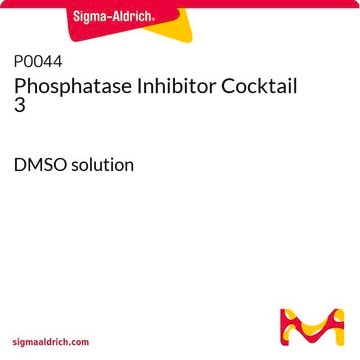208851
Calyculin A
from Discodermia calyx, ≥98% (HPLC), crystalline (powder), protein phosphatases types 1 and 2A inhibitor, Calbiochem
Synonyme(s) :
Calyculin A, Discodermia calyx
About This Item
Produits recommandés
product name
Calyculin A, Discodermia calyx, Calyculin A, CAS 101932-71-2, is a cell-permeable inhibitor of protein phosphatase 2A (IC₅₀ = 0.5-1 nM) and protein phosphatase 1 (PP1; IC₅₀ = 2 nM).
Niveau de qualité
Pureté
≥98% (HPLC)
Forme
crystalline (powder)
Fabricant/nom de marque
Calbiochem®
Conditions de stockage
OK to freeze
desiccated (hygroscopic)
protect from light
Couleur
white
Solubilité
ethanol: 2 mg/mL
DMSO: soluble
Conditions d'expédition
ambient
Température de stockage
−20°C
InChI
1S/C50H81N4O15P/c1-29(20-22-51)16-14-17-30(2)32(4)24-33(5)42(57)35(7)38(55)25-41(65-13)45-46(69-70(61,62)63)49(8,9)50(68-45)26-39(56)34(6)40(67-50)19-15-18-36-27-66-48(53-36)31(3)21-23-52-47(60)44(59)43(58)37(28-64-12)54(10)11/h14-18,20,24,27,31,33-35,37-46,55-59H,19,21,23,25-26,28H2,1-13H3,(H,52,60)(H2,61,62,63)/b16-14+,18-15+,29-20-,30-17+,32-24+/t31-,33+,34+,35+,37-,38-,39-,40+,41-,42+,43-,44-,45+,46-,50-/m0/s1
Clé InChI
FKAWLXNLHHIHLA-QJLNTFFJSA-N
Description générale
Actions biochimiques/physiologiques
PP2A
Conditionnement
Avertissement
Reconstitution
Autres remarques
Takeuchi, T., et al. 1994. Biochem. Biophys. Res. Commun. 205, 1803.
Figurov, A., et al. 1993. Eur. J. Neurosci. 5,1083.
Song, Q., and Lavin, M.F. 1993. Biochem. Biophys. Res. Commun.190, 47.
Gopalakrishna, R., et al. 1992. Biochem. Biophys. Res. Commun.189, 950.
Carl, A., et al. 1991. Am. J. Physiol.261, C387.
Suganuma, M., et al. 1990. Cancer Res.50, 3521.
Cohen, P. 1989. Annu. Rev. Biochem. 58, 453.
Cohen, P., et al. 1989. J. Biol. Chem.264, 21435.
Ishihara, H., et al. 1989. Biochem. Biophys. Res. Commun.159, 871.
Kato, Y., et al. 1988. J. Org. Chem.53, 3930.
Kato, Y., et al. 1986. J. Am. Chem. Soc.108, 2780.
Informations légales
Mention d'avertissement
Danger
Mentions de danger
Conseils de prudence
Classification des risques
Acute Tox. 3 Dermal - Acute Tox. 3 Inhalation - Acute Tox. 3 Oral - Skin Irrit. 2
Code de la classe de stockage
6.1C - Combustible acute toxic Cat.3 / toxic compounds or compounds which causing chronic effects
Classe de danger pour l'eau (WGK)
WGK 3
Point d'éclair (°F)
Not applicable
Point d'éclair (°C)
Not applicable
Certificats d'analyse (COA)
Recherchez un Certificats d'analyse (COA) en saisissant le numéro de lot du produit. Les numéros de lot figurent sur l'étiquette du produit après les mots "Lot" ou "Batch".
Déjà en possession de ce produit ?
Retrouvez la documentation relative aux produits que vous avez récemment achetés dans la Bibliothèque de documents.
Notre équipe de scientifiques dispose d'une expérience dans tous les secteurs de la recherche, notamment en sciences de la vie, science des matériaux, synthèse chimique, chromatographie, analyse et dans de nombreux autres domaines..
Contacter notre Service technique






